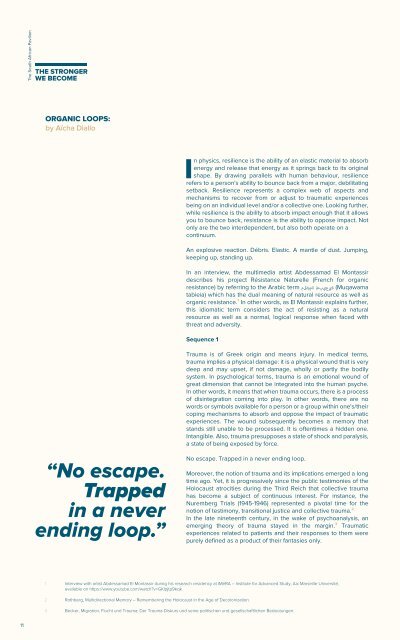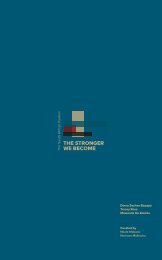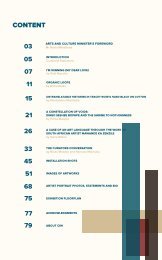The-Stronger-We-Become-Catalogue
Create successful ePaper yourself
Turn your PDF publications into a flip-book with our unique Google optimized e-Paper software.
<strong>The</strong> South African Pavilion<br />
THE STRONGER<br />
WE BECOME<br />
ORGANIC LOOPS:<br />
by Aïcha Diallo<br />
In physics, resilience is the ability of an elastic material to absorb<br />
energy and release that energy as it springs back to its original<br />
shape. By drawing parallels with human behaviour, resilience<br />
refers to a person's ability to bounce back from a major, debilitating<br />
setback. Resilience represents a complex web of aspects and<br />
mechanisms to recover from or adjust to traumatic experiences<br />
being on an individual level and/or a collective one. Looking further,<br />
while resilience is the ability to absorb impact enough that it allows<br />
you to bounce back, resistance is the ability to oppose impact. Not<br />
only are the two interdependent, but also both operate on a<br />
continuum.<br />
An explosive reaction. Débris. Elastic. A mantle of dust. Jumping,<br />
keeping up, standing up.<br />
In an interview, the multimedia artist Abdessamad El Montassir<br />
describes his project Résistance Naturelle (French for organic<br />
resistance) by referring to the Arabic term ةيعيبط ةمواقم (Muqawama<br />
tabieia) which has the dual meaning of natural resource as well as<br />
organic resistance.¹ In other words, as El Montassir explains further,<br />
this idiomatic term considers the act of resisting as a natural<br />
resource as well as a normal, logical response when faced with<br />
threat and adversity.<br />
Sequence 1<br />
Trauma is of Greek origin and means injury. In medical terms,<br />
trauma implies a physical damage: it is a physical wound that is very<br />
deep and may upset, if not damage, wholly or partly the bodily<br />
system. In psychological terms, trauma is an emotional wound of<br />
great dimension that cannot be integrated into the human psyche.<br />
In other words, it means that when trauma occurs, there is a process<br />
of disintegration coming into play. In other words, there are no<br />
words or symbols available for a person or a group within one's/their<br />
coping mechanisms to absorb and oppose the impact of traumatic<br />
experiences. <strong>The</strong> wound subsequently becomes a memory that<br />
stands still unable to be processed. It is oftentimes a hidden one.<br />
Intangible. Also, trauma presupposes a state of shock and paralysis,<br />
a state of being exposed by force.<br />
“No escape.<br />
Trapped<br />
in a never<br />
ending loop.”<br />
No escape. Trapped in a never ending loop.<br />
Moreover, the notion of trauma and its implications emerged a long<br />
time ago. Yet, it is progressively since the public testimonies of the<br />
Holocaust atrocities during the Third Reich that collective trauma<br />
has become a subject of continuous interest. For instance, the<br />
Nuremberg Trials (1945-1946) represented a pivotal time for the<br />
notion of testimony, transitional justice and collective trauma.²<br />
In the late nineteenth century, in the wake of psychoanalysis, an<br />
emerging theory of trauma stayed in the margin.³ Traumatic<br />
experiences related to patients and their responses to them were<br />
purely defined as a product of their fantasies only.<br />
1 Interview with artist Abdessamad El Montassir during his research residency at IMéRA – Institute for Advanced Study, Aix Marseille Université,<br />
available on https://www.youtube.com/watch?v=GKIpjtp9kqk<br />
2 Rothberg, Multidirectional Memory – Remembering the Holocaust in the Age of Decolonization.<br />
3 Becker, Migration, Flucht und Trauma: Der Trauma-Diskurs und seine politischen und gesellschaftlichen Bedeutungen.<br />
11




